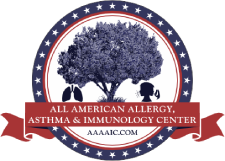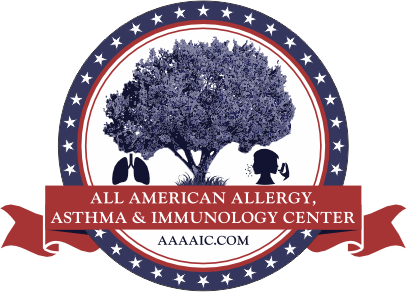Background – Drug hypersensitivity reactions result when the immune system targets a drug or metabolite of a drug and attack it via an inflammatory cascade mediated by IgE antibody or non- IgE mechanisms. IgE antibodies fight the “enemy” drug allergens by releasing histamine and other chemicals, which trigger the symptoms of an allergic reaction. The symptoms usually manifest seconds up to an hour after administration of the drug. The symptoms may be mild (rashes, hives, itching, swelling) or severe (trouble breathing, wheezing, loss of consciousness). A drug allergy can be fatal. Non IgE mediated reactions occur later but also can cause mild to severe symptoms that can last for days to weeks. Drug hypersensitivity reactions can happen the first time you take a drug, but sometimes an allergy doesn’t develop until there have been repeated exposures. Intolerances to drugs may produce symptoms like an allergic reaction, but do not involve the immune system at all. Your allergy provider will assist with diagnosing the type of reaction. Some medications are more likely to cause allergic reactions than others. The medications that most often cause allergic reactions include:
- Antibiotics, such as penicillin
- Aspirin and non-steroidal anti-inflammatory medications (NSAIDs), such as ibuprofen
- Anticonvulsants
- Monoclonal antibody therapy
- Chemotherapy
How it works/Pathophysiology – Exposure to a drug that one is allergic to cause the immune system to produce an antibody (IgE). The IgE antibody in turns makes inflammatory cells that line the tissues in the body release inflammatory mediators such as Histamine and Leukotrienes. These inflammatory mediators can cause symptoms that adversely affect the airways, skin, gut and even the cardiovascular system. The same can also occur by direct activation of inflammatory cells by the drug. These inflammatory mediators can cause symptoms that adversely affect the airways, skin, gut and even the cardiovascular system. For non- mediated reactions, the inflammatory cascade is ignited through several pathways such as T cells and complement system.
Symptoms –
- Symptoms of a mild vaccine reaction may include:
- Itchy or runny nose, sneezing
- Itchy or tingling sensation in the mouth
- A few hives, mild itching of skin
- Mild nausea or discomfort
- More severe symptoms include:
- Hives over large area of the body
- Shortness of breath, wheezing, repetitive cough
- Swelling of tongue or lips
- Hoarse, tightness in throat, trouble breathing or swallowing
- Pale/blueish appearance, faint, dizzy
- Stomach discomfort such as abdominal cramps, diarrhea, vomiting
- Feeling of impending doom
The most severe drug allergic reaction is anaphylaxis which is a life-threatening whole-body reaction that can impair your breathing, cause a dramatic drop in your blood pressure, and affect your heart rate. Anaphylaxis can come on within minutes of exposure to the trigger vaccine and can be fatal if not treated promptly with an injection of epinephrine (adrenaline).
Diagnostic Testing – Drug skin testing consist of Prick or Intradermal Skin testing consist of pricking or intradermally introducing the arms and/or back with a diluted dose of the drug in question. 20 minutes later, the wheel and flare of the prick site is measured, and the allergy provider will discuss the results and overall interpretation.
Patch Skin Testing consists of directly exposing a patient’s skin to a suspected drug. Very small chambers containing different potential allergens are taped to a patient’s back for several days to see what skin reaction(s) occur. Chambers may contain a variety of substances to include drugs and preservatives. Localized patches of inflammation appear within 2 to 4 days, or even up to a week, if a skin allergy is present.
Drug Challenge Testing consists administration of the drug in question under clinical supervision. It is usually done in a stepwise fashion over increments of time (i.e 10% then 30min later the remaining 90%; 10/90 challenge). Then the patient is observed for at least 1 hr. This test is the most accurate diagnostic testing for drug allergies. The test is conducted under physician supervision. The allergy provider will determine the patient’s candidacy.
Therapies:
Avoidance – All patients with a confirmed allergic reaction should practice strict avoidance of the drug and relatives of the drug that triggered the reaction. Your allergy provider will provide a comprehensive list of the related drugs to avoid.
NSAID/ASA Desensitization – Aspirin desensitization involves gradually exposing your body to controlled doses of the drug to build up a tolerance, which can enable tolerance of ASA or an NSAID without adverse symptoms. This is a type of drug challenge test that requires pretreatment with antihistamines and steroids. It also takes 2-3 days. This therapy is very effective and generally reserved for patients with Aspirin Exacerbated Respiratory Disease (AERD). Your allergy provider will determine your candidacy for this therapy.
Penicillin Allergy Delabeling – Penicillin allergy is the most common drug allergy with nearly 10% of the population report being allergic to penicillin. However, studies have confirmed that up to 90% of the people with a distant (at least 10 years) history of a non-severe reaction in the setting of penicillin or relative can actually tolerate penicillin. CDC guidelines suggest that before physicians prescribe broad-spectrum antibiotics to a patient thought to be penicillin-allergic, they should be evaluated for true penicillin allergy (IgE-mediated) by an allergist. Penicillins are safe, have less bacterial resistance, and are lower costing for patients and healthcare systems. Through detailed history taking and review of your medical chart, your allergy provider will determine if you are a candidate for penicillin delabeling protocol. The penicillin delabeling protocol consists of penicillin skin testing, penicillin oral challenge and observation for at least 1 hr after the final dose.

